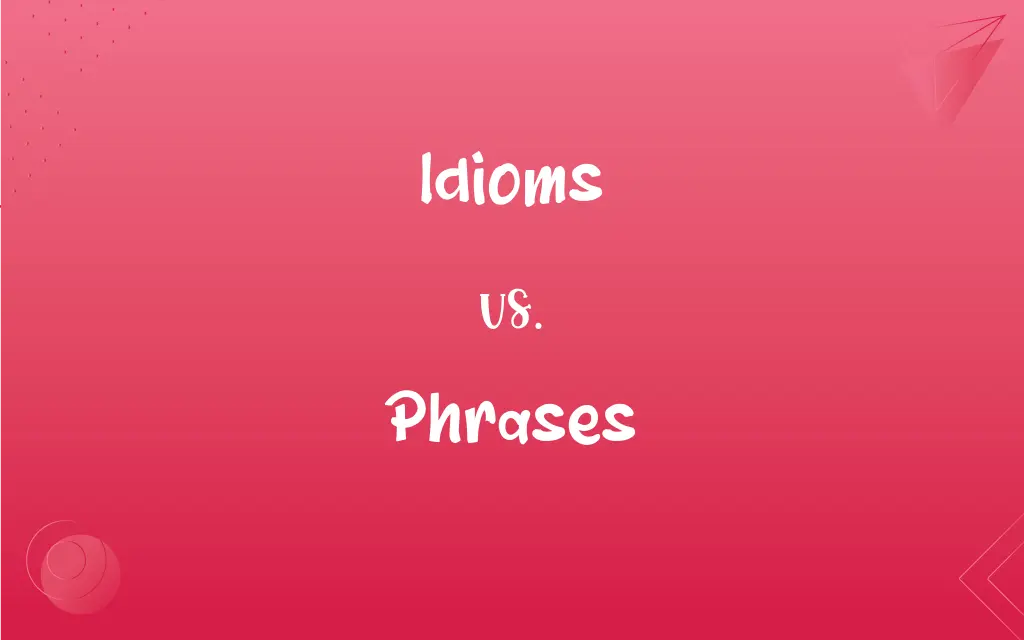Idioms vs. Phrases: What's the Difference?
Edited by Aimie Carlson || By Harlon Moss || Published on January 17, 2024
Idioms are expressions with meanings not deducible from their individual words, while phrases are groups of words conveying a concept but not a complete sentence.

Key Differences
Idioms are figurative expressions where the meaning isn't directly related to the individual words. Phrases are a collection of words that may convey an idea but don't necessarily have a figurative meaning.
The understanding of idioms often requires cultural or contextual knowledge. In contrast, the meaning of a phrase can typically be understood from the literal meanings of its words.
Idioms are used to express ideas in a non-literal, often more vivid manner. Phrases can be literal or figurative, serving various roles in a sentence, such as a noun or verb phrase.
Learning idioms can be challenging for non-native speakers due to their non-literal nature. Phrases, however, are often easier to understand and use in everyday language.
Idioms can enrich language with cultural nuances. Phrases, while versatile in usage, don't typically carry the same cultural weight.
ADVERTISEMENT
Comparison Chart
Definition
Expressions with meanings not inferred from individual words.
Groups of words that express a concept.
Meaning
Figurative and often culturally specific.
Literal or figurative, generally straightforward.
Use in Language
Adds color and cultural depth.
Forms part of sentence structure.
Learning Difficulty
Challenging for non-native speakers due to non-literal nature.
Easier to understand, more direct.
Examples
"Break the ice," "hit the nail on the head."
"Running quickly," "a bunch of grapes."
ADVERTISEMENT
Idioms and Phrases Definitions
Idioms
Idioms are fixed expressions where changing words alters the meaning.
Bite the bullet means to endure a painful experience.
Phrases
Phrases often convey literal meanings.
A bouquet of flowers is a phrase describing a bunch of flowers.
Idioms
Idioms are expressions with a meaning different from the literal interpretation.
Saying it's raining cats and dogs means it's raining heavily.
Phrases
Phrases are groups of words that work together as a single unit.
In a fast-running cheetah, fast-running is a phrase describing the cheetah.
Idioms
Idioms often reflect cultural idioms or traditions.
Spill the beans is an idiom meaning to reveal a secret.
Phrases
Phrases are building blocks of sentences.
After the long journey is a phrase setting the time context.
Idioms
Idioms add expressiveness and color to language.
Cost an arm and a leg indicates something very expensive.
Phrases
Phrases can function as nouns, verbs, adjectives, or adverbs.
In jumping for joy, jumping is a verb phrase.
Idioms
Idioms cannot be understood just by knowing the meanings of individual words.
Kick the bucket is an idiom for dying.
Phrases
Phrases can be part of a sentence but don't express a complete thought.
Under the weather is a phrase meaning feeling ill.
Idioms
A speech form or an expression of a given language that is peculiar to itself grammatically or cannot be understood from the individual meanings of its elements, as in keep tabs on.
Phrases
A sequence of words that have meaning, especially when forming part of a sentence.
Idioms
The specific grammatical, syntactic, and structural character of a given language.
Phrases
A characteristic way or mode of expression
An apt turn of phrase.
Idioms
Regional speech or dialect.
Phrases
A brief, apt, and cogent expression
The phrase "out of the frying pan and into the fire.".
Idioms
A specialized vocabulary used by a group of people; jargon
Legal idiom.
Phrases
(Music) A short passage or segment, often consisting of four measures or forming part of a larger unit.
Idioms
A style of artistic expression characteristic of a particular individual, school, period, or medium
The idiom of the French impressionists.
The punk rock idiom.
Phrases
A series of dance movements forming a unit in a choreographic pattern.
Idioms
Plural of idiom
Phrases
To express orally or in writing
The speaker phrased several opinions.
Phrases
To divide (a passage) into phrases.
Phrases
To combine (notes) in a phrase.
Phrases
To make or express phrases.
Phrases
(Music) To perform a passage with the correct phrasing.
Phrases
Plural of phrase
Phrases
Infl of phrase
FAQs
How do idioms enhance language?
Idioms add color, expressiveness, and cultural nuances to language.
Is it easy for non-native speakers to understand idioms?
Idioms can be challenging for non-native speakers due to their figurative and cultural aspects.
What is a phrase?
A phrase is a group of words that express a concept but don't form a complete sentence.
Are idioms literal in meaning?
No, idioms typically have meanings that can't be deduced from the literal interpretation of words.
Can phrases stand alone?
Phrases can't stand alone as complete sentences but contribute to the overall sentence structure.
What is an idiom?
An idiom is a figurative expression with a meaning not directly related to the individual words.
Are phrases always literal?
Phrases can be either literal or figurative, depending on their use.
How do phrases function in a sentence?
Phrases can function as nouns, verbs, adjectives, or adverbs in sentences.
Do phrases have a fixed structure?
No, phrases can vary in structure and word order.
Can idioms be translated directly into other languages?
Direct translation of idioms may not convey the same meaning, due to their figurative nature.
Can idioms vary across cultures?
Yes, idioms often have cultural significance and can vary between languages and cultures.
How are phrases useful in writing?
Phrases help build complex and varied sentence structures, enhancing writing quality.
Can phrases be a part of idioms?
Yes, idioms are often phrases with a figurative meaning.
Are there rules for creating idioms?
Idioms don't follow specific rules for creation; they often develop organically in a language.
Are idioms important for language learners?
Learning idioms can help language learners understand the cultural context and nuances of the language.
Can phrases be used in formal writing?
Yes, phrases are commonly used in both formal and informal writing.
Are idioms used in professional settings?
Depending on the context, idioms can be used in professional settings to convey ideas vividly.
Do phrases have to be grammatically correct?
Within a sentence, phrases should conform to grammatical rules for coherence and clarity.
Do idioms change over time?
Yes, idioms can evolve, and their usage may change over time.
How do phrases contribute to language fluency?
Using phrases correctly contributes to fluency and clarity in communication.
About Author
Written by
Harlon MossHarlon is a seasoned quality moderator and accomplished content writer for Difference Wiki. An alumnus of the prestigious University of California, he earned his degree in Computer Science. Leveraging his academic background, Harlon brings a meticulous and informed perspective to his work, ensuring content accuracy and excellence.
Edited by
Aimie CarlsonAimie Carlson, holding a master's degree in English literature, is a fervent English language enthusiast. She lends her writing talents to Difference Wiki, a prominent website that specializes in comparisons, offering readers insightful analyses that both captivate and inform.







































































